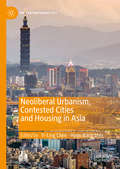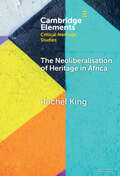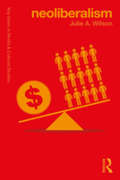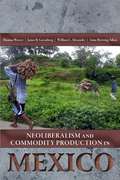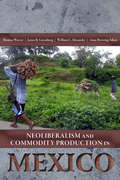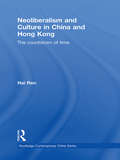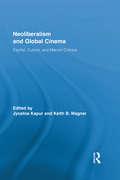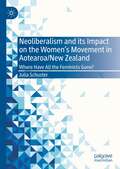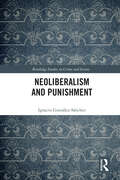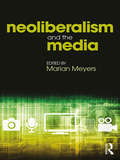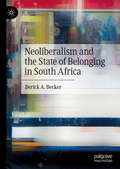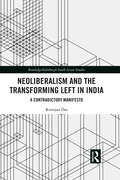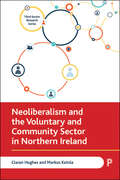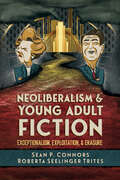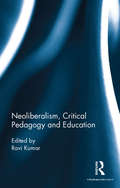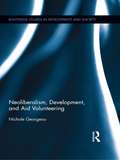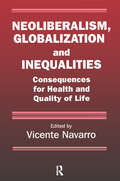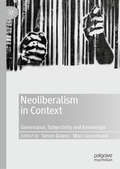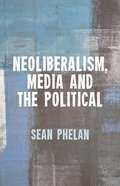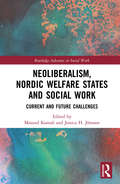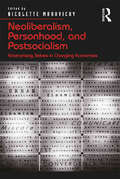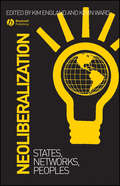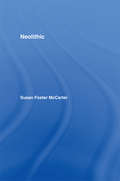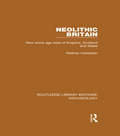- Table View
- List View
Neoliberal Urbanism, Contested Cities and Housing in Asia (The Contemporary City)
by Yi-Ling Chen Hyun Bang ShinConsidering Asian cities ranging from Taipei, Hong Kong and Bangkok to Hanoi, Nanjing and Seoul, this collection discusses the socio-political processes of how neoliberalization entwines with local political economies and legacies of ‘developmental’ or ‘socialist’ statism to produce urban contestations centered on housing. The book takes housing as a key entry point, given its prime position in the making of social and economic policies as well as the political legitimacy of Asian states. It examines urban policies related to housing in Asian economies in order to explore their continuing alterations and mutations, as they come into conflict and coalesce with neoliberal policies. In discussing the experience of each city, it takes into consideration the variegated relations between the state, the market and the society, and explores how the global pressure of neoliberalization has manifested in each country and has influenced the shaping of national housing questions.
The Neoliberalisation of Heritage in Africa (Elements in Critical Heritage Studies)
by Rachel KingThe landscape of heritage on the African continent is the product of neoliberal economic and social interventions from the 1980s–2000s: the prevalence and influence of heritage NGOs; aid for cultural programmes contingent on government reforms; the use of national heritage policies and projects to signal ready capital; experiments in custodianship and private enterprise that balance conservation with consumerism; and so on. This Element synthesises literature from anthropology, archaeology, history, and geography to describe a significant period of heritage policy and discourse on the African continent – its historical situation, on-the-ground realities, and continuing legacies in the era of sustainable development and climate crises.
Neoliberalising Old Age
by John MacnicolGovernments are encouraging later-life working and state pension ages are being raised. There is also a growing debate on intergenerational equity and on ageism/age discrimination. John Macnicol, one of Europe's leading academic analysts of old age and ageing, examines the effect of neoliberalism on the recent ageing and social policy agenda in the UK and the USA. He argues that the demographic and economic impulses behind recent policy changes are in fact less important than the effect of neoliberalism as an ideology, which has caused certain key problems to be defined in a particular way. The book outlines past theories of old age and examines pensions reform, the debate on life expectancy gains, the causes of retirement, the idea of intergenerational equity, the current debate on ageism/age discrimination and the likely human consequences of raising state pension ages.
Neoliberalism (Key Ideas in Media & Cultural Studies)
by Julie A. WilsonThanks to the rise of neoliberalism over the past several decades, we live in an era of rampant anxiety, insecurity, and inequality. While neoliberalism has become somewhat of an academic buzzword in recent years, this book offers a rich and multilayered introduction to what is arguably the most pressing issue of our times. Engaging with prominent scholarship in media and cultural studies, as well as geography, sociology, economic history, and political theory, author Julie Wilson pushes against easy understandings of neoliberalism as market fundamentalism, rampant consumerism, and/or hyper-individualism. Instead, Wilson invites readers to interrogate neoliberalism in true cultural studies fashion, at once as history, theory, practice, policy, culture, identity, politics, and lived experience. Indeed, the book’s primary aim is to introduce neoliberalism in all of its social complexity, so that readers can see how neoliberalism shapes their own lives, as well as our political horizons, and thereby start to imagine and build alternative worlds.
Neoliberalism and Commodity Production in Mexico
by James B. Greenberg Thomas Weaver Anne Browning-Aiken William L. AlexanderNeoliberalism and Commodity Production in Mexico details the impact of neoliberal practice on the production and exchange of basic resources in working-class communities in Mexico. Using anthropological investigations and a market-driven approach, contributors explain how uneven policies have undermined constitutional protections and working-class interests since the Mexican Revolution of 1910. Detailed ethnographic fieldwork shows how foreign investment, privatization, deregulation, and elimination of welfare benefits have devastated national industries and natural resources and threatened agriculture, driving the campesinos and working class deeper into poverty. Focusing on specific commodity chains and the changes to production and marketing under neoliberalism, the contributors highlight the detrimental impacts of policies by telling the stories of those most affected by these changes. They detail the complex interplay of local and global forces, from the politically mediated systems of demand found at the local level to the increasingly powerful municipal and state governments and the global trade and banking institutions. Sharing a common theoretical perspective and method throughout the chapters, Neoliberalism and Commodity Production in Mexico is a multi-sited ethnography that makes a significant contribution to studies of neoliberal ideology in practice.
Neoliberalism and Commodity Production in Mexico (G - Reference, Information And Interdisciplinary Subjects Ser.)
by Thomas Weaver James B. Greenberg William L. Alexander Anne Browning-AikenNeoliberalism and Commodity Production in Mexico details the impact of neoliberal practice on the production and exchange of basic resources in working-class communities in Mexico. Using anthropological investigations and a market-driven approach, contributors explain how uneven policies have undermined constitutional protections and working-class interests since the Mexican Revolution of 1910. Detailed ethnographic fieldwork shows how foreign investment, privatization, deregulation, and elimination of welfare benefits have devastated national industries and natural resources and threatened agriculture, driving the campesinos and working class deeper into poverty. Focusing on specific commodity chains and the changes to production and marketing under neoliberalism, the contributors highlight the detrimental impacts of policies by telling the stories of those most affected by these changes. They detail the complex interplay of local and global forces, from the politically mediated systems of demand found at the local level to the increasingly powerful municipal and state governments and the global trade and banking institutions. Sharing a common theoretical perspective and method throughout the chapters, Neoliberalism and Commodity Production in Mexico is a multi-sited ethnography that makes a significant contribution to studies of neoliberal ideology in practice.
Neoliberalism and Culture in China and Hong Kong: The Countdown of Time (Routledge Contemporary China Series)
by Hai RenThis book examines the period leading up to the Hong Kong handover in 1997 - the 'countdown of time', and by using iconic cultural symbols such as the countdown clock, the Hong Kong Museum exhibitions and cultural heritage sites, argues that China has undergone a transition to neoliberal state, in part through its reunification with Hong Kong. The problem of synchronization with the world, a Chinese phrase that epitomizes China's engagement with modern capitalism since the first Opium War, was characterized throughout the 20th century as a 'humiliation', 'weakness', 'tragedy' and 'disaster', with China in the role of the victim of capitalist globalization. During the reunification with Hong Kong, these conventional expressions were replaced by new ones such as 'de-humiliation', 'return', 'self-esteem' and 'revival'. Hai Ren gives an ethnographic and historical analysis of this cultural and political transformation of China's globalization experience by looking closely at public history practices in mainland China and Hong Kong and how the reconfiguration of everyday life and cultural norms led to the development of this neoliberal China. As a book which straddles Chinese and Hong Kong, history, politics, cultural heritage and museum studies more generally, it can be regarded as a work of cultural political economy which will appeal to students and scholars of all of the above.
Neoliberalism and Global Cinema: Capital, Culture, and Marxist Critique (Routledge Advances in Film Studies)
by Jyotsna Kapur Keith B. WagnerIn cinema studies today, rarely do we find a direct investigation into the culture of capitalism and how it has been refracted and fabricated in global cinema production under neoliberalism. However, the current economic crisis and the subsequent Wall Street bailout in 2008 have brought about a worldwide skepticism regarding the last four decades of economic restructuring and the culture that has accompanied it. In this edited volume, an international ensemble of scholars looks at neoliberalism, both as culture and political economy, in the various cinemas of the world. In essays encompassing the cinemas of Asia, Africa, Latin America, Europe, and the United States the authors outline how the culture and subjectivities engendered by neoliberalism have been variously performed, contested, and reinforced in these cinemas. The premise of this book is that the cultural and economic logic of neoliberalism, i.e., the radical financialization and market-driven calculations, of all facets of society are symptoms best understood by Marxist theory and its analysis of the central antagonisms and contradictions of capital. Taking a variety of approaches, ranging from political economy, ideological critique, the intersection of aesthetics and politics, social history and critical-cultural theory, this volume offers a fresh, broad-based Marxist analysis of contemporary film/media. Topics include: the global albeit antagonistic nature of neoliberal culture; the search for a new aesthetic and documentary language; the contestation between labor and capital in cultural producion; the political economy of hollywood, and questions of gender, sexuality, and the nation state in relation to neoliberalism.
Neoliberalism and its Impact on the Women's Movement in Aotearoa/New Zealand: Where Have All the Feminists Gone?
by Julia SchusterThis book investigates how neoliberalism shaped the women’s movement in Aotearoa/New Zealand from the mid-1980s to late 2010s and looks at the future of the movement. Based on an empirical study that encompasses the three levels of the movement—individualised feminism, the work of women’s organisations, and state feminism—it explores how neoliberal rationality, promoted by governments over three decades, has impacted feminist identification and activism as well as political opportunities for organisations and institutions working within the movement. Exploring the diversity of feminist voices, the author analyses intersectional, (post)colonial and intergenerational debates within the movement in the context of neoliberalism’s influence on feminist values and strategies, and examines whether neoliberal rationality succeeded in depoliticising, individualising and fragmenting the movement. The book comes to the conclusion that despite some severe drawbacks, internal conflicts and changes of strategies, the women’s movement in Aotearoa/New Zealand has survived the impact of neoliberalism. This book will be of interest to scholars of Gender Studies, Sociology, Political Science, and Women’s History, as well as feminist activists.
Neoliberalism and Punishment (Routledge Studies in Crime and Society)
by Ignacio González-SánchezExploring the expansion of the penal system in Spain during the first 40 years of democracy, this book puts forward the importance of studying punishment from a sociological perspective and examines the neoliberal penality thesis.Today, Spain has more police officers and more people in prison than 50 years ago and a tougher penal code than that which existed at Franco’s death; however, crime has not increased for three decades, while most of the hardening of the penal system has occurred after its stabilisation. Studying the development of penality in Spanish democracy, this book explores Loïc Wacquant’s proposal that the expansion of the penal system should be understood as a characteristic of neoliberalism. It examines the parallel and reciprocal development of three policies in relation to the gradual implementation of neoliberal ideas and highlights how the evolution of the labour market, social policies, and the penal system are linked to one another and to neoliberal ideas related to the sacralisation of the utilitarian individual and the role of the state.Advocating for a sociological study of state punishment and contributing to a better understanding of the implementation of neoliberal policies, Neoliberalism and Punishment will be of great interest to students and scholars of criminology, sociology, and politics.
Neoliberalism and the Media
by Marian MeyersThis book examines the multiple ways that popular media mainstream and reinforce neoliberal ideology, exposing how they promote neoliberalism’s underlying ideas, values and beliefs so as to naturalize inequality, undercut democracy and contribute to the collapse of social notions of community and the common good. Covering a wide range of media and genres, and adopting a variety of qualitative textual methodologies and theoretical frameworks, the chapters examine diverse topics, from news coverage of the 2016 U.S. presidential election to the NBC show Superstore (an atypical instance in which a TV show, for one brief season, challenged the central tenets of neoliberalism) to "kitchen porn." The book also takes an intersectional approach, as contributors explore how gender, race, class and other aspects of social identity are inextricably tied to each other within media representation. At once innovative and distinctive in its illustration of how the media is complicit in perpetuating neoliberal ideology, Neoliberalism and the Media offers students and scholars alike an incisive portrait of the intersection between media and ideology today.
Neoliberalism and the State of Belonging in South Africa
by Derick A. BeckerThis book explains the making of the South African state and thereby contributes to the development theory by analyzing the concept of the embedded neoliberal state. The author offers a theoretical exploration of state formation as an inherently interconnected international and domestic social process as applied to the history and development of South Africa. A genuine social science that eschews disciplinary boundaries, this will appeal to a wide audience of scholars in the fields of political development, political science, African and development studies.
Neoliberalism and the Transforming Left in India: A contradictory manifesto (Routledge/Edinburgh South Asian Studies Series)
by Ritanjan DasWest Bengal has often been perceived as somewhat of an aberration in the wider context of a rather chaotic Indian democracy, as the Left Front (spearheaded by the Communist Party of India-Marxist, CPIM) demonstrated a rare instance of political stability, decisively winning seven consecutive democratic elections from 1977 to 2006. Its development record has also been substantial, with a focus on land reforms, the panchayati-raj institution, and an agriculture centric development agenda. This book presents a reappraisal of the political economic history of the CPIM/Left Front regime against the backdrop of the Indian reform experience. It examines two distinct areas: the conditions that necessitated the regime to engineer a transition from an erstwhile agricultural-based growth model to a more pro-market economic agenda post-1991, and the political strategy employed to manage such a transition, attract private capital and at the same time sustain the regime’s traditional rhetoric and partisan character. In order to develop a more textured understanding of the recent political developments in West Bengal, the author applies a historically nuanced and inductive political-economic analysis, which draws on published materials, and primary material such as government documents and interviews (with bureaucrats, political activists, members of the intelligentsia and ministers). A valuable contribution to the ongoing debate in the literature on the drifts underway with the Indian Left and India’s economic transformation post-1990s, this book will be of interest to academics in the field of Political Science, Government, Political Economy and South Asian Studies.
Neoliberalism and the Voluntary and Community Sector in Northern Ireland (Third Sector Research Series)
by Ciaran Hughes Markus KetolaThis book charts the changing relationships between government, voluntary and community organisations in Northern Ireland since the Good Friday Agreement. It considers the role these actors have played in rolling out and normalising neoliberal discourses and policies. With lessons about the impact of neoliberal policies on governance, relationships and the peace process, this study explores how a core part of civil society has been shaped by both local policy priorities and broader political and economic processes.
Neoliberalism and Young Adult Fiction: Exceptionalism, Exploitation, and Erasure (Children's Literature Association Series)
by Sean P. Connors Roberta Seelinger TritesIn the twenty-first century, the influence of neoliberalism, the belief that society benefits when both individuals and corporations are free to maximize their talents in the service of responding to social needs and problems, resonates through all domains of human life. And yet, little critical study has been given to the reproduction of a neoliberal social order in YA literature. Neoliberalism and Young Adult Fiction: Exceptionalism, Exploitation, and Erasure examines how some YA literature naturalizes neoliberalism in positioning teenagers as self-enclosed, competitive individuals. At the same time, however, the authors also examine other YA novels as potential sites of resistance that acknowledge teenagers’ agency to reject neoliberalism’s destructive impulses and to work for social justice and equality through collective action.With that in mind, the authors of Neoliberalism and Young Adult Fiction analyze such concepts as how the exceptionality of specific characters who embody neoliberal ideals leads to self-enclosed individualism and how environmental exploitation and consumerism lead to destructive effects. The book progresses to an in-depth examination of how racism undergirds US neoliberalism and environmental exploitation. From scrutinizing racism—and the rejection of neoliberalism inherent in the antiracism movement—the study turns to an examination of gender, specifically focusing on the relationship between sexism, exploitation, and embodied rejections of patriarchal thinking. Indeed, erasure is implicated in racism, sexism, and all forms of discrimination that are borne of exploitation. Finally, youth activism—with its rejection of neoliberal ideologies—leads to a culminating chapter about how global youth link YA literature to their protest movements.
Neoliberalism, Critical Pedagogy and Education
by Ravi KumarThis volume examines the role of neoliberalism and its impact on education in South Asia. It contends that education is in a state of crisis across the world. This is reflected not only in the way the state has withdrawn to pave way for private capital but also in the manner in which knowledge and ways of understanding the world are being challenged by manipulation and adverse influences. A process of ‘factoryisation’ is underway as disciplining of human minds and redefinition of the purpose of human existence are being geared to fall in line with the needs of private capital. The book brings together incisive contributions from India, Sri Lanka, Pakistan and Nepal to explore newer possibilities to deal with the educational crisis, and looks at a range of critical themes in education: pedagogy, teacher–learner relationship, teacher education, the state of the university, and policy. Rich in content, critical and insightful, this book will be a valuable addition for scholars and researchers of education and education policy, sociology, public policy and South Asian Studies.
Neoliberalism, Development, and Aid Volunteering (Routledge Studies in Development and Society #33)
by Nichole GeorgeouThis work comes at an important time of global crisis and change, where the world is ravaged by natural disasters, wars and poverty. This has increased the pressure on governments and other organisations, such as volunteer sending agencies, which provide aid, and we have seen an upward trend in the number of people volunteering abroad. Within this volatile environment, neoliberal ideology on how aid should be provided and implemented has become embedded in how policy is formulated. A market-driven model of aid provision has become the norm, and governments are increasingly focused on international development volunteering as a form of ‘soft diplomacy’. This is the first qualitative empirical study of international development volunteering. The book contributes theoretical knowledge on International Volunteering Sending Agencies (IVSAs) and examines practitioner experience in development volunteering in the context of emerging policy developments. Critical analysis highlights the impact of global and social changes and provides a nuanced understanding of development volunteer motivation, and the relationship between volunteers and sending agencies. The book also puts forward an agenda and model for volunteer sending that addresses the complexities and diversity of the volunteer experience.
Neoliberalism, Globalization, and Inequalities: Consequences for Health and Quality of Life (Policy, Politics, Health and Medicine Series)
by Vicente NavarroSince U.S. President Reagan and U.K. Prime Minister Thatcher, a major ideology (under the name of economic science) has been expanded worldwide that claims that the best policies to stimulate human development are those that reduce the role of the state in economic and social lives: privatizing public services and public enterprises, deregulating the mobility of capital and labor, eliminating protectionism, and reducing public social protection. This ideology, called 'neoliberalism,' has guided the globalization of economic activity and become the conventional wisdom in international agencies and institutions (such as the IMF, World Bank, World Trade Organization, and the technical agencies of the United Nations, including the WHO). Reproduced in the 'Washington consensus' in the United States and the 'Brussels consensus' in the European Union, this ideology has guided policies widely accepted as the only ones possible and advisable.This book assembles a series of articles that challenge that ideology. Written by well-known scholars, these articles question each of the tenets of neoliberal doctrine, showing how the policies guided by this ideology have adversely affected human development in the countries where they have been implemented.
Neoliberalism in Context: Governance, Subjectivity and Knowledge
by Simon Dawes Marc LenormandNeoliberalism in Context adopts a processual, relational and contextual framework, bringing together contributions from diverse national and disciplinary contexts, and bridging theoretical and methodological approaches to critiquing neoliberalism. The book presents arguments on the extent to which we are still living in neoliberal times, and illustrates examples of variation in the practice of neoliberalization and within neoliberal thought. The contributions also examine the mediation and significance of existing neoliberalism on subjectivity, and address the consequences of the neoliberalization of education for critical thinking generally, and for the critique of neoliberalism in particular. This collection will be of interest to students and scholars across sociology, international relations, urban studies, and media and cultural studies.To access an introduction by Simon Dawes, and an interview with Jamie Peck, download the front and back matter for free from SpringerLink.
Neoliberalism, Media and the Political
by Sean PhelanNeoliberalism, Media and the Political examines the condition of media and journalism in neoliberal cultures. Emphasizing neoliberalism's status as a political ideology that is simultaneously hostile to politics, the book presents a critical theoretical argument supported by empirical illustrations from New Zealand, Ireland, the UK and the US.
Neoliberalism, Nordic Welfare States and Social Work: Current and Future Challenges (Routledge Advances in Social Work)
by Masoud Kamali Jessica H. JönssonHow have three decades of neoliberalism affected the Nordic welfare states as well as the organisation, education and practices of social work in those countries? During recent decades the welfare states of Denmark, Finland, Norway and Sweden have gone through dramatic changes infl uenced by the political triumph of neoliberalism. This has led to both the electoral success of extreme right and mainstream neoliberal parties, and to the neoliberal ideological transformations of social democratic parties. The neoliberal doctrine of making governance cheaper has thus been made the focus of governance and has led to increased marginalisation and social problems. This is the first book to comparatively explore the role of neoliberal reforms on social work and social policy across the Nordic welfare states. The richly theoretical and empirical chapters explore and illustrate the consequences of the dominance of neoliberal policies and provide an analysis of the effects of globalisation, glocalisation, welfare nationalism, symbolic violence and forced migration. The book provides valuable insights into the shortcomings of retreating welfare states in a time of increasing glocal social problems. Neoliberalism, Nordic Welfare States and Social Work should be considered essential reading for critical social work education. Students, scholars, educators and researchers of Nordic countries and beyond have much to learn from this book.
Neoliberalism, Personhood, and Postsocialism: Enterprising Selves in Changing Economies
by Nicolette MakovickyDespite a growing literature debating the consequences of neo-liberal political and economic policy in the former Eastern bloc, the idea of neo-liberal personhood has so far received limited attention from scholars of the region. Presenting a range of ethnographic studies, this book lays the groundwork for a new disciplinary agenda by critically examining novel technologies of self-government which have appeared in the wake of political and economic liberalization. Neoliberalism, Personhood, and Postsocialism explores the formation of subjectivities in newly marketized or marketizing societies across the former Eastern Bloc, documenting the rise of the neo-liberal discourse of the ’enterprising’ self in government policy, corporate management and education, as well as examining the shifts in forms of capital amongst marginal capitalists and entrepreneurs working in the grey zone between the formal and informal economies. A rich investigation of the tools of neo-liberal governance and the responses of entrepreneurs and families in changing societies, this book reveals the full complexity of the relationship between historically and socially embedded economic practices, and the increasing influence of libertarian political and economic thought on public policy, institutional reform, and civil society initiatives. As such, it will appeal to anthropologists, sociologists and geographers with interests in political discourse, identity, entrepreneurship and organizations in post-socialist societies.
Neoliberalization: States, Networks, Peoples (Antipode Book Series #30)
by Kim England Kevin WardThe book is an analysis of cultural, social as well as political economic expressions of neoliberalization and argues for an appreciation of the relational geographies of neoliberalization. In-depth empirical research spanning a variety of world regions A range of topics including homelessness, comparative politics, economic development and social policy Reviews how neoliberalism is enacted as a way to highlight the complexity and contingency of this economic model Engages in debates within anthropology, gender studies, geography, health studies, international studies, planning, political science and sociology
Neolithic
by Susan McCarterThis excellent introductory textbook describes and explains the origins of modern culture– the dawn of agriculture in the Neolithic area. Written in an easy-to-read style, this lively and engaging book familiarises the reader with essential archaeological and genetic terms and concepts, explores the latest evidence from scientific analyses as varied as deep sea coring, pollen identification, radiometric dating and DNA research, condensing them into an up-to-date academic account, specifically written to be clear even the novice reader. Focusing primarily on sites in southwest Asia, Neolithic addresses questions such as: Which plants and animals were the first to be domesticated, and how? How did life change when people began farming? What were the first villages like? What do we know about the social, political and religious life of these newly founded societies? What happened to human health as a result of the Neolithic Revolution? Lavishly illustrated with almost a hundred images, this enjoyable book is an ideal introduction both for students of archaeology and for general readers interested in our past.
Neolithic Britain: New Stone Age sites of England, Scotland and Wales (Routledge Library Editions: Archaeology)
by Rodney CastledenThe climax of the Stone Age in Britain, the Neolithic period (4700-2000BC), was a period of startling achievement. The British Isles are rich in Neolithic sites, which give us evidence of a complex and surprisingly developed archaic society. The author surveys 1100 secular and ceremonial sites in Britain, selecting some for detailed explanation; from these a sense of the diversity and dynamism of the living Neolithic communities emerges. He presents a comprehensive, profusely illustrated and up-to-date view of the Neolithic, organised by county. Archaeologists and prehistorians will find this book of interest and it should prove indispensable to students of archaeology as a source of information about the British Neolithic.
